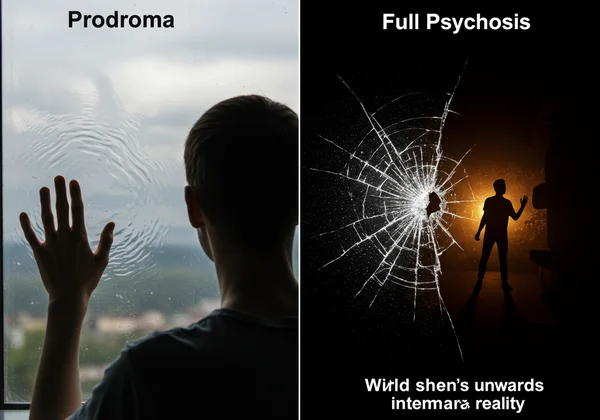Early Psychosis Signs: Understanding Prodromal Schizophrenia with a Confidential Test
It's often confusing and isolating, that time before a clear-cut illness fully develops. For schizophrenia, this early stage is known as the prodromal phase—a critical time marked by subtle but significant changes in thoughts, feelings, and behaviors. You might feel like something is "off" but struggle to pinpoint exactly what. How does schizophrenia start off? It often begins not with a sudden break, but with a slow and subtle drift from your usual self. This article aims to bring clarity to this "at-risk mental state," helping you understand the earliest indicators, why they matter, and what you can do to find answers and support. Recognizing these signs is the first, most powerful step toward early intervention and better long-term well-being. If you're looking for initial clarity, a confidential self-assessment can be a valuable starting point.
What Are the Early Signs of Psychosis? Identifying Subtle Changes
The prodromal phase is characterized by attenuated, or weakened, symptoms that don't yet meet the full criteria for psychosis. These are not dramatic hallucinations or delusions, but rather gentle shifts that can be easily dismissed as stress, anxiety, or typical adolescent moodiness. Understanding these nuances is key to early recognition. These changes often fall into two main categories: shifts in your internal world and how you interact with the external world.
Subtle Shifts in Behavior, Mood, and Social Interactions
One of the first things individuals or their loved ones might notice is a gradual withdrawal from social life. A once-outgoing person might start avoiding friends, spending more time alone, or losing interest in hobbies they used to enjoy. This isn't just a desire for quiet time; it's often accompanied by a growing sense of unease or suspicion around others.
Mood changes are also common. You might experience increased irritability, anxiety, or feelings of depression that seem to have no clear cause. There can be a "blunting" of emotions, where your emotional responses become less intense or expressive than usual. This pulling back from social life and emotions can leave you feeling deeply isolated, making it incredibly tough to seek help. It’s a quiet drift away from connection, often driven by an internal turmoil that is difficult to articulate.

Changes in Thinking, Perception, and Everyday Functioning
Changes in your thinking are a hallmark of the prodromal stage. You might find it increasingly difficult to concentrate, organize your thoughts, or follow a conversation. School or work performance may decline as tasks that were once easy become challenging. This "brain fog" can be frustrating and alarming, leading to a drop in self-confidence.
Perceptual changes can also occur, though they are typically mild. You might see fleeting shadows in the corner of your eye, hear faint whispers that you can't quite make out, or feel that colors seem more intense or sounds are louder than normal. These experiences are often confusing because they are brief and you may still have the insight to question whether they were real. These subtle disturbances in perception and thinking are often the most personal and difficult signs to share with others.

Recognizing Schizophrenia Prodrome Symptoms in Detail
To better understand the prodrome, clinicians often categorize symptoms into groups: positive, negative, and cognitive. This framework helps organize the wide range of experiences that can occur during this sensitive period. Knowing these categories can help you identify and describe what you or a loved one might be going through with greater precision.
Common Prodromal Symptoms Explained (Positive, Negative, Cognitive)
Positive symptoms refer to experiences that are added to a person's reality. In the prodromal phase, these are "attenuated" or sub-threshold. Examples include unusual or odd beliefs that are not yet delusional, heightened suspiciousness or paranoid ideas, and mild perceptual abnormalities like seeing things unclearly or hearing indistinct sounds.
Negative symptoms involve a reduction or loss of normal functions. This is often the most noticeable change to family and friends. It includes a marked decrease in motivation (avolition), reduced speech (alogia), a diminished ability to experience pleasure (anhedonia), and a flattened emotional expression (affective flattening). Someone might neglect personal hygiene or lose interest in their goals.
Cognitive symptoms impact mental processes. These include problems with attention, memory, and executive functions like planning and decision-making. You might struggle to keep track of information, find it hard to maintain focus during a lecture, or feel that your thoughts are disorganized and jumbled.
How Prodromal Symptoms Differ from Full-Blown Psychosis
The key difference between the prodromal phase and active psychosis lies in the intensity, frequency, and your level of insight. During the prodrome, unusual experiences are often fleeting and less severe. For example, you might have a passing thought that people are watching you, but you can quickly dismiss it as unlikely. In full psychosis, this belief becomes a fixed, unshakable delusion.
Similarly, a perceptual disturbance in the prodrome might be a faint, whisper-like sound, whereas in psychosis, it could be a clear, distinct voice holding a conversation. Crucially, you often still have insight during the prodromal phase—you can recognize that your experiences are strange and may question your own perceptions. This insight is a critical window of opportunity for seeking help and starting a conversation about mental health.

Understanding the At-Risk Mental State (ARMS) and Its Importance
The term "At-Risk Mental State" (ARMS) is the clinical designation for the prodromal period. It highlights that individuals experiencing these symptoms have a higher-than-average risk of developing a psychotic disorder like schizophrenia. However, it is not a guarantee. Identifying as being in an "at-risk" state is not a diagnosis but a call to action—a signal that proactive support and monitoring are essential.
Defining ARMS: Who Is Considered At-Risk?
A person is typically considered to be in an at-risk mental state if they meet one of three criteria: they experience attenuated positive psychotic symptoms; they have brief, self-resolving episodes of full-blown psychosis (lasting less than a week); or they have a significant genetic risk (like a first-degree relative with schizophrenia) combined with a marked decline in functioning. Understanding your personal risk factors can provide context for your experiences. An online schizophrenia test can serve as a private way to explore these potential signs.
The Role of Early Intervention and Screening Tools Like the PQ-21
This is where the power of early intervention shines. Research consistently shows that the sooner support is provided, the better the long-term outcomes. Early intervention can help manage symptoms, reduce distress, improve social and occupational functioning, and in some cases, may even delay or prevent the onset of full psychosis.
Screening tools play a vital role in this process. Questionnaires like the Prodromal Questionnaire (PQ), which is the basis for our confidential screening, are designed specifically to detect these early warning signs. They provide a structured, evidence-based way to review your experiences and determine if they align with the known indicators of an at-risk mental state. Taking such a test is a proactive, private, and empowering step toward understanding your mental health.
Empowering Yourself with Knowledge and the Next Steps
Navigating the uncertainty of the prodromal phase can be daunting, but knowledge is a powerful tool. Understanding that these subtle changes have a name and are recognized clinical phenomena can reduce feelings of fear and isolation. You are not alone in this experience.
Recognizing the signs of the schizophrenia prodrome is not about jumping to conclusions but about opening a door to conversation and support. It's about empowering yourself or your loved one to take the next step, whether that's speaking with a trusted family member, a school counselor, or a healthcare professional.
If what you've read resonates with you, consider exploring further. A great first step can be taking a free, confidential assessment to organize your thoughts and gain preliminary insights. To learn more about your experiences, take our free test on our homepage. It's a simple, secure way to begin your journey toward clarity.

Frequently Asked Questions About the Prodromal Phase
How Early Does Schizophrenia Typically Begin?
While the first full psychotic episode in schizophrenia most often occurs in the late teens to early 30s, the prodromal symptoms can begin months or even years earlier. It is common for these subtle signs to emerge during mid-to-late adolescence, a time when they are often mistaken for normal teenage development, making early detection challenging but crucial.
What's the Difference Between Prodromal Symptoms and Mild Schizophrenia?
Prodromal symptoms refer specifically to the warning signs that appear before the onset of a full psychotic disorder. "Mild schizophrenia," on the other hand, might be used to describe a diagnosed case where the symptoms are less severe or are well-managed with treatment. The key distinction is timing: the prodrome is a pre-illness, at-risk phase, not a formal diagnosis of schizophrenia.
Can Prodromal Symptoms Be Prevented or Reversed?
Not everyone who experiences prodromal symptoms will go on to develop schizophrenia. For a significant portion of individuals, these symptoms may resolve on their own or never progress. Early intervention strategies, such as therapy (especially Cognitive Behavioral Therapy for Psychosis), stress management, family support, and maintaining a healthy lifestyle, can significantly reduce the risk of progression and improve overall well-being.
How Can I Assess My Risk for Prodromal Symptoms?
The most definitive way to assess your risk is through a clinical evaluation with a mental health professional specializing in early psychosis. However, a structured self-assessment can be an incredibly helpful first step. It allows you to privately review your experiences against established criteria. If you're wondering about your own potential risk, you can use our online tool to gain preliminary insights that can help you prepare for a conversation with a doctor.